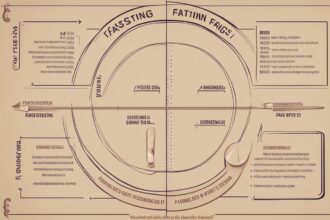Hey there, health enthusiasts! If you’re on a journey to better wellness, you’ve likely stumbled across the age-old debate of health fasting versus traditional dieting. Both approaches promise weight loss, improved energy, and better overall health, but which one truly delivers? As someone who’s dabbled in both, I’m excited to break this down for you. In this post, we’ll dive deep into what fasting and dieting entail, their benefits and challenges, and how they impact your body on a scientific level. Whether you’re curious about intermittent fasting for health or calorie-restrictive diets, stick with me to uncover practical tips and evidence-based insights to help you decide what’s best for your lifestyle.
What is Health Fasting, and How Does It Work?
Let’s start with health fasting, a practice that’s gained massive popularity in recent years. Fasting isn’t just about skipping meals; it’s a structured approach to eating where you alternate between periods of eating and abstaining from food. The most common method, intermittent fasting (IF), includes patterns like the 16/8 method (fast for 16 hours, eat during an 8-hour window) or the 5:2 diet (eat normally for 5 days, restrict calories on 2 days). The goal? Give your body a break from constant digestion to trigger metabolic benefits. Studies suggest fasting can improve insulin sensitivity and promote cellular repair through autophagy, a process where cells clean out damaged components (Mattson et al., 2017). But it’s not a one-size-fits-all solution, and we’ll explore why as we go.
Understanding Traditional Dieting: The Classic Approach
On the other hand, traditional dieting focuses on controlling what and how much you eat, often through calorie restriction or specific food group limitations. Think low-carb, low-fat, or Mediterranean diets. The idea is simple: create a calorie deficit to lose weight or follow a structured plan for health benefits. While dieting offers flexibility in food choices, it often requires constant tracking and willpower. Research shows that long-term adherence to restrictive diets can be tough, with many regaining lost weight within a year (Mann et al., 2007). So, while dieting can work for some, it’s worth asking if it’s sustainable compared to fasting for wellness.
Health Benefits: Fasting vs Dieting Head-to-Head
Both health fasting and dieting aim to improve well-being, but their benefits differ based on how they affect your body. Let’s compare some key areas:
- Weight Loss: fasting can lead to rapid initial weight loss by reducing overall calorie intake and boosting fat-burning hormones like norepinephrine (Zauner et al., 2000). Dieting also works through a calorie deficit but often at a slower pace.
- Metabolic Health: Intermittent fasting has been shown to improve insulin resistance and lower blood sugar levels, potentially reducing the risk of type 2 diabetes (Horne et al., 2015). Dieting, especially balanced plans like the Mediterranean diet, can achieve similar results but requires consistent effort.
- Heart Health: Fasting may reduce markers of inflammation and improve cholesterol levels (Mattson et al., 2017). Dieting focused on heart-healthy foods (think omega-3s and fiber) offers comparable benefits but depends on food quality.
- Brain Function: fasting might enhance brain health by increasing the production of brain-derived neurotrophic factor (BDNF), linked to better cognitive function (Mattson et al., 2018). Dieting’s impact on the brain is less direct but can support mental clarity through nutrient-dense foods.
Clearly, both have their strengths, but fasting for health often provides quicker metabolic shifts, while dieting emphasizes long-term nutritional balance.
Potential Risks and Challenges to Consider
Before jumping into either health fasting or dieting, let’s talk about the downsides. fasting isn’t for everyone—some folks experience irritability, fatigue, or headaches during the initial adjustment, often called the “fasting flu.” There’s also a risk of overeating during eating windows, which can negate benefits. For dieting, the biggest hurdle is sustainability; restrictive plans can lead to nutrient deficiencies or disordered eating patterns if not done mindfully (Mann et al., 2007). Both approaches require caution, especially for pregnant individuals, those with medical conditions, or anyone with a history of eating disorders. Always consult a healthcare provider before starting a new regimen.
Practical Tips for Success with Fasting or Dieting
Ready to try one of these methods? I’ve got you covered with actionable advice to make health fasting or dieting work for you. Here’s how to get started without feeling overwhelmed:
- Start Small with Fasting: If you’re new to fasting for wellness, begin with a 12/12 schedule (12 hours fasting, 12 hours eating) before progressing to 16/8. It eases your body into the rhythm.
- Hydrate Like Crazy: Whether fasting or dieting, drink plenty of water. During fasting, it helps curb hunger; during dieting, it supports metabolism.
- Plan Balanced Meals: For dieting, focus on whole foods—veggies, lean proteins, and healthy fats. If fasting, prioritize nutrient-dense foods in your eating window to avoid deficiencies.
- Listen to Your Body: Feeling dizzy or overly hungry? Take a break. Neither method should leave you miserable—adjust as needed.
- Track Progress Beyond Weight: Monitor energy levels, mood, and sleep quality. Both fasting and dieting impact more than just the scale.
Remember, consistency beats perfection. Whether you’re exploring intermittent fasting for health or a structured diet, small, steady changes lead to lasting results.
Which Should You Choose? Personalizing Your Approach
Here’s the million-dollar question: Is health fasting better than dieting for you? Honestly, it depends on your goals, lifestyle, and personality. Fasting suits those who prefer simplicity and don’t mind skipping meals, especially if you’re busy and can skip breakfast without stress. Dieting might be your jam if you love food variety and enjoy planning meals, even if it means tracking calories. Research supports both for weight loss and health improvements, but long-term success hinges on what you can stick with (Trepanowski et al., 2017). Try experimenting—maybe combine elements of both, like fasting a few days a week while following a balanced diet otherwise. Your body will tell you what feels right.
In wrapping up, the battle of fasting versus dieting doesn’t have a clear winner—it’s all about what aligns with your life. health fasting offers a unique way to reset your metabolism and simplify eating, often with quicker results in areas like insulin sensitivity and fat loss. Traditional dieting, meanwhile, provides structure and flexibility to tailor nutrition to your needs, though it demands more daily effort. Whichever path you choose, prioritize sustainability and listen to your body’s signals. Health isn’t a race; it’s a lifelong journey. So, why not start small, experiment with fasting for wellness or a new diet plan, and see where it takes you? Drop a comment below—I’d love to hear your experiences or answer any questions about getting started!
References
- Horne, B. D., Muhlestein, J. B., & Anderson, J. L. (2015). Health effects of intermittent fasting: Hormesis or harm? A systematic review. The American Journal of Clinical Nutrition, 102(2), 464-470.
- Mann, T., Tomiyama, A. J., Westling, E., Lew, A. M., Samuels, B., & Chatman, J. (2007). Medicare’s search for effective obesity treatments: Diets are not the answer. American Psychologist, 62(3), 220-233.
- Mattson, M. P., Longo, V. D., & Harvie, M. (2017). Impact of intermittent fasting on health and disease processes. Ageing Research Reviews, 39, 46-58.
- Mattson, M. P., Moehl, K., Ghena, N., Schmaedick, M., & Cheng, A. (2018). Intermittent metabolic switching, neuroplasticity and brain health. Nature Reviews Neuroscience, 19(2), 63-80.
- Trepanowski, J. F., Kroeger, C. M., Barnosky, A., Klempel, M. C., Bhutani, S., Hoddy, K. K., … & Varady, K. A. (2017). Effect of alternate-day fasting on weight loss, weight maintenance, and cardioprotection among metabolically healthy obese adults: A randomized clinical trial. JAMA Internal Medicine, 177(7), 930-938.
- Zauner, C., Schneeweiss, B., Kranz, A., Madl, C., Ratheiser, K., Kramer, L., … & Lenz, K. (2000). Resting energy expenditure in short-term starvation is increased as a result of an increase in serum norepinephrine. The American Journal of Clinical Nutrition, 71(6), 1511-1515.






